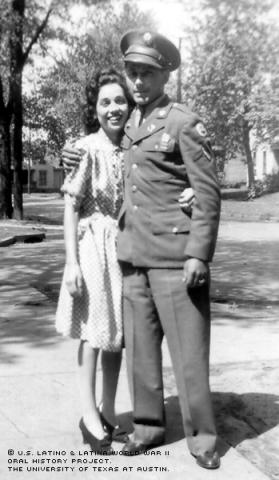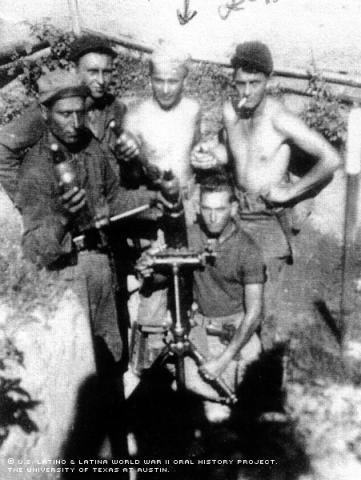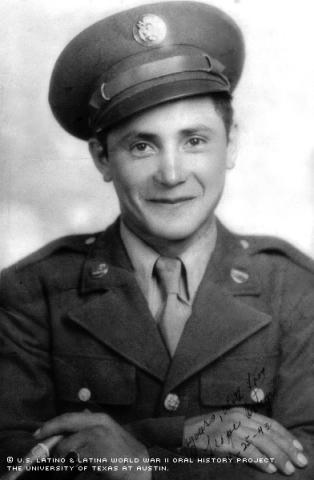


By Gillian Lawlor
Guadalupe Ortega remembers having to put a dead Japanese soldier into a foxhole with him to escape detection by enemy forces -- just one incident in his harrowing World War II military career.
Even before he received his call for duty, Ortega knew he’d probably be drafted, but didn’t relish the idea of joining the military. Although his near-death experiences in the Army justified his trepidation, he also acknowledges what he learned as a soldier helped him long afterward.
Ortega eventually earned many medals, including the Victory Medal, American Theater Ribbon, an Asiatic Pacific Theater Ribbon with four Bronze Battle Stars, two Overseas Service Bars and the Good Conduct Medal. A valuable soldier to his troop, his lieutenant offered him the chance to become a corporal if he remained in the Army for three more months. Ortega declined, stating he didn't believe such a position would help him in the civilian job market to which he hoped to return, adding, "I want to go home."
Ortega was born March 10, 1921, in Asherton, Texas. He recalls participating in many sports as a child, including boxing and baseball. An excellent student and baseball pitcher, Ortega was told that unlike many of his peers, he should consider going to high school. His father had died a few years before, however, so he decided to enter the workforce to help support his family.
Ortega held a variety of jobs in the early years of his life. At 18, he was helping to haul gravel onto trucks before working up to the driver's position. Soon, though, he got into a position computing figures and, at a baseball game, met his future wife Carlota Ayala. It seemed life was looking up for the young Ortega, but then the attack on Pearl Harbor occurred and many of his peers, including his older brother, were shipped off to war.
Shortly after his first wedding anniversary, Ortega was inducted into the Army on May 12, 1943.
He first served at Fort Riley in Kansas, where he trained at the Cavalry Training Replacement Center.
"A whole lot of us went there for horse cavalry training," Ortega said. "The majority that were there did not know a horse from a cow.
"I tell you one thing, the horses there were smarter than half of the people riding them," he said with a smile.
Ortega's expertise with horses and as a marksman even won him three three-day passes.
"At a gallop, everybody that makes expert gets a three-day pass'" he recalled his commanding officer saying. "So at a gallop, I hit 42 our of 43 silhouette targets."
Having just made Corporal, Ortega took nine days off on the condition he’d be back for duty on the ninth day. On the tenth day, when he had yet to return, Ortega was caught on a train in the U.S. and forced to return to his post.
"And they picked me up for being AWOL," he said with a small smile, adding that he was "busted" down and ordered to stay in a form of military confinement for seven days.
After his basic training, he was sent to Fort Brown in Texas.
"While I was in the service, I was five four, 125 pounds, and that's where the boxing came in handy, believe me," he said. "They didn't like the people from the north, especially more so if you were a Mexican."
Ortega soon proved himself in the field. He managed to work his way up to gunner, despite the great deal of discrimination he faced.
Ortega went on to serve in the 5332 Brigade (Provisional), also known as the MARS Task Force, a reformed unit containing many members of the Merrill's Marauders.
In this unit, Ortega learned a great deal about the hardships of war.
"We were told that we would have one mission only," he said. "And everyone thought that's great ... but one particular mission meant that we had to fight our way up the Burma Road and then circle behind enemy lines to cut them off at Southern China."
During his "one mission" Ortega and his troops had no water supply except for what they could get from bamboo stalks and swamps. Many in his troop suffered from malaria and dysentery as they walked the 300-plus miles it’d take them to get to South China, part of the strategy to cut off the Japanese supply line, known as the Burma Road. The tactic came with a heavy price: Several of Ortega’s comrades died around him during the journey.
"3,000 Marsmen consisting of the 475th Infantry and the 124th Cavalry were sent," he wrote after his interview, "and only a few returned.
"We carried our wounded comrades and those killed in action, to our medics in the rear. This was the most painful duty, and the emotional pain will always be a part of my history."
Ortega was discharged Dec. 20, 1945, at the rank of Tec 5. In the end, his determination to succeed helped him prove himself to his Army colleagues, despite his distaste for some of the military's requirements.
Returning to Saginaw had some downfalls as well. His young daughter called her grandfather "Dad" and needed time to adjust to the father she barely knew. Ortega was patient and worked his way into her life.
Trying to adjust completely to the civilian lifestyle, he took advantage of the GI Bill of Rights and enrolled in Greens Barber College. After finishing his apprenticeship, Ortega opened "Lupe's Barber Shop," which he ran for 25 years. Ortega also continued taking electrician classes at night school and eventually earned his Master Contractor's License.
Ortega started his own company, Ortega Electrical Contracting, Inc., which has continued for more than thirty years. It was while working on an electrical job for Michigan's Own Military and Space Museum that his story first became public. Impressed by his achievements, the Museum's director, Stan Bovich, created an exhibit to commemorate his efforts.
Ortega remembers Bovich's claim he’d make Ortega into a hero, as well as his response: "I've been a hero for many years. But nobody knows and I don't tell them," Ortega said.
Mr. Ortega was interviewed in Saginaw, Michigan, on October 19, 2002, by Gloria Monita.

